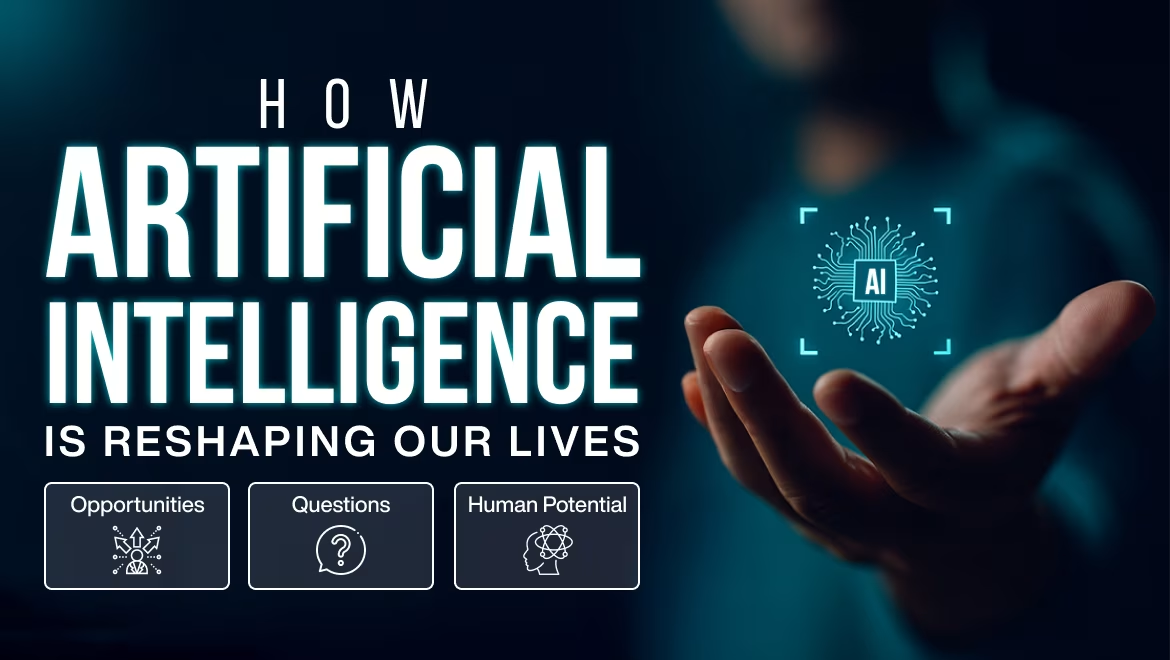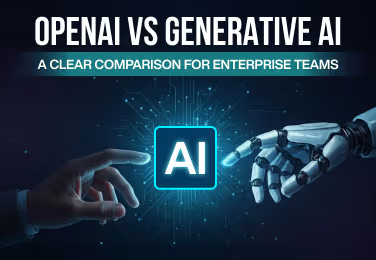

- By Admin
- 22 July, 2025
- 10 min Read
How Artificial Intelligence Is Reshaping Our Lives: Opportunities, Questions, and Human Potential
Artificial Intelligence (AI) is no longer a futuristic concept—it is the fabric of modern innovation. From how we communicate and learn to how businesses operate and governments make decisions, AI is silently and profoundly transforming life as we know it. But while the technology advances rapidly, the societal understanding of its implications still lags. This article explores AI’s influence across personal, financial, and professional spheres, assesses its impact on key industries, and separates fact from fear about its effects on humanity.
AI in Everyday Life: From Personal Use to Financial Empowerment
AI is now embedded in many daily tools we take for granted. Personal assistants like Alexa or Siri, recommendation systems on Netflix or Spotify, facial recognition on smartphones—all are powered by machine learning algorithms that continuously improve from user interaction. On a financial level, AI supports fraud detection, robo-advisors in wealth management, credit risk modeling, and algorithmic trading. According to a 2023 McKinsey report, AI-driven financial services could add $1 trillion of additional value to the global banking industry annually.
In education, AI supports adaptive learning platforms, helping students receive personalized feedback based on their performance. In health, AI is aiding early diagnosis—IBM Watson reportedly identifies cancer types with an accuracy that often matches or exceeds expert physicians.
AI Across Industries: Healthcare, Retail, Manufacturing, and Beyond
AI’s disruption is not limited to tech companies. In healthcare, AI algorithms now help analyze X-rays, predict patient deterioration, and personalize treatment plans. A study published in Nature (2020) found Google's AI system outperformed radiologists in detecting breast cancer, demonstrating both higher accuracy and fewer false positives.
In retail, giants like Amazon use AI to optimize logistics, predict customer behavior, and automate inventory management. AI also drives the backend of supply chains—forecasting demand, preventing shortages, and reducing waste.
Manufacturing, once reliant on human oversight for precision tasks, now uses AI to enable predictive maintenance, quality control, and even generative design, where software proposes engineering solutions. AI in industrial automation is projected to reach $296 billion by 2028, according to MarketsandMarkets.
“AI Will Replace Humans”? Not Quite.
The fear that AI will replace humans is widespread—but largely misunderstood. AI is not here to replace us. It’s here to augment us. At Aryabh Consulting, we believe that the real power of AI lies in enhancing human potential, not eroding it.
As Professor Erik Brynjolfsson of Stanford University puts it: “AI will not replace humans, but humans using AI will replace those who don’t.” AI excels at repetitive, high-volume tasks and data analysis. Humans, on the other hand, excel at creativity, emotional intelligence, strategic thinking, and complex problem-solving. The synergy of both offers exponential potential.
The Benefits of AI for the New Workforce
For young professionals and students entering the workforce, AI is more than a buzzword—it’s a career enabler. Entry-level jobs in fields like marketing, data analysis, and customer service now rely on AI tools to analyze trends, automate campaigns, or handle repetitive queries. This allows new workers to focus on higher-value tasks like client engagement, storytelling, and problem-solving.
Moreover, AI literacy is becoming a vital skill across industries. Knowing how to work with AI—not just use it, but understand its biases, inputs, and limitations—will define the next generation of leaders.
Does AI Make Smart People Smarter—and Others Not?
There's a growing debate around whether AI amplifies cognitive disparities. Research from the University of Zurich (2022) found that people with higher baseline analytical skills benefited more from AI-assisted decision-making than those with lower skills—unless proper training was provided. Without understanding how to use AI tools critically, individuals can become over-reliant, accepting flawed outputs without questioning their basis.
The solution? Education and digital literacy. AI must be democratized—not just through access to tools but also through knowledge about how they work, where they fail, and how they can be made better.
Will Artificial Intelligence End Human Intelligence?
A more dystopian view is that AI may erode our own thinking skills. If we rely on generative tools to write, think, or even decide, do we risk losing those very abilities ourselves?
It’s a valid concern—but not a new one. Every major technological leap—from the calculator to the internet—sparked fears of intellectual decline. Yet, what history shows is that human intelligence evolves with technology. AI is not the end of human intelligence; it is its next chapter. The challenge is ensuring we guide that chapter wisely.
The Pros and Cons of AI
Pros:
- Efficiency: Automates repetitive tasks, saving time and resources.
- Personalization: Delivers tailored experiences across education, healthcare, and business.
- Accuracy: Reduces errors in complex fields like diagnostics and finance.
- Scalability: Solves problems at a scale no human team could manage.
Cons:
- Bias: AI learns from data, and biased data leads to biased outcomes.
- Job Displacement: Certain roles, especially those based on routine tasks, may be phased out.
- Lack of Transparency: Black-box models make it hard to trace AI decisions.
- Overreliance: Without oversight, there is a risk of blindly trusting flawed models.
How to Make Artificial Intelligence Work for You
AI can be a powerful tool in your personal and professional life—but only if you use it the right way. Here’s how you can make AI work for you, while avoiding common mistakes.
1. Use AI to Save Time, Not to Think for You
AI can help you:
- Draft emails or documents
- Summarize articles or reports
- Find patterns in data
- Get quick answers to questions
But AI isn’t perfect. It can make mistakes or give wrong information. Don’t rely on it without checking.
Tip: Always review AI-generated content. Use it as a helper, not a decision-maker.
2. Know the Right Tasks for AI
AI is great at:
- Repetitive tasks (like sorting data or auto-replies)
- Organizing information
- Helping with language or content
But it's not good at:
- Making emotional or ethical decisions
- Understanding complex situations
- Giving legal or medical advice
Tip: Use AI for simple, clear tasks. For serious decisions, trust human judgment.
3. Watch Out for AI Misuse
Sometimes AI is used the wrong way—intentionally or by mistake. Here are a few risks:
- Plagiarism: Copying AI-generated work without credit
- Bias: AI giving unfair results because of bad training data
- Fake content: Deepfakes or fake news made by AI
- Over-trust: Believing everything AI says without checking
Tip: Always fact-check AI outputs. Use ethical tools. Don’t use AI to cheat, mislead, or copy.
4. Learn the Basics of AI
You don’t need to be a tech expert—but knowing how AI works helps you use it better.
Start with simple topics like:
- How AI tools learn from data
- What AI can and can’t do
- Why AI sometimes gives wrong answers
- Learn concepts like AI hallucinations
- Learn how to give the AI the right Prompt
There are free videos, articles, and short courses online that explain this in simple terms.
5. Use AI to Boost Your Strengths
AI works best when it helps you do better—not when it replaces your thinking.
For example:
- Writers can use AI to brainstorm ideas
- Designers can use AI to test layout options
- Students can use AI to quiz themselves or review topics
- Business owners can use AI to analyze customer feedback
Tip: Let AI handle the routine work, so you can focus on creative thinking and smart decisions.
AI is not something to fear—but it’s also not something to follow blindly. When used carefully, it can make you faster, more efficient, and better informed. Learn how it works, use it responsibly, and keep control of the choices you make.
Need Guidance on Using AI the Right Way?
If you're exploring how AI can improve your business processes, decision-making, or customer experience—but aren’t sure where to start—Aryabh Consulting’s AI Consulting Services can help. We work with organizations to design, implement, and scale responsible AI solutions tailored to real business needs. From workflow automation and predictive analytics to ethical AI design, our approach ensures the technology works for your people and not the other way around.
Explore our AI Consulting Services